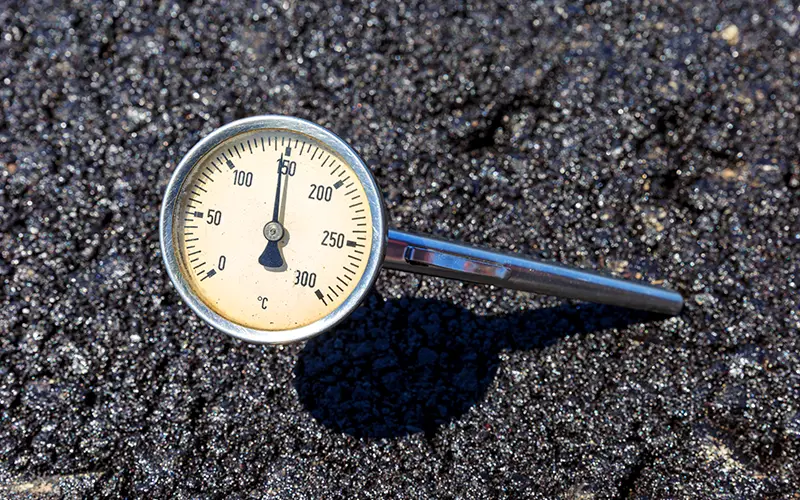Asphalt is also referred to as bitumen whose main source is petroleum from where it is derived as a semi-solid compound and it is a thick, sticky, black, highly viscous liquid. It is classed as pitch and it is found in both natural deposits as well as in refined products. Asphaltum was the term that was used for asphalt before the 20th century. The Pitch Lake located in La Brea in southwest Trinidad which is an Antilles island located on the northeastern coast of Venezuela within the Siparia Regional Corporation consists of the largest natural asphalt quality control deposits in the world that are accounted for almost 10 million tons.
The primary use of asphalt goes into the construction of the road which accounts for 70% of the asphalt that is explored. Here the asphalt is used as glue and the binder is mixed with the construction aggregate materials in order to develop the asphalt concrete. Sealing flat roofs, production of roofing felts and bituminous waterproofing products are the main products that are developed by Asphalt Quality Control other than concrete.
Naturally occurring asphalt whose viscosity is very similar to that of cold molasses is referred to as “crude bitumen”. But when the crude oil undergoes fractional distillation where it is heated at a temperature of 525 °C (977 °F), the asphalt that is generated in the process is referred to as “refined bitumen”. The widest reserve of natural asphalt is in the Canadian province of Alberta where asphalt is mostly found in Athabasca oil sand that covers about 142000 square kilometers which is an area larger than the geography of England.
With the change in the temperature, the properties of the asphalt also change. It is because of the specific range when attained by the asphalt, its viscosity results in compaction by providing enough lubrication to the particles during the process of compaction. When the temperature is low, the particles of aggregate cannot move swiftly, thus the required density is not reached. An asphalt plant is responsible for producing asphalt where the plant could be fixed or it could be a mobile mixture in a plant.
It is possible to produce asphalt in a plant that accounts for almost 800 tonnes per hour. The average temperature that is required to produce a hot mix of Asphalt Quality Control is between 150 and 180°C. But new techniques are developed these days to produce a mix of asphalt at low temperatures.
Types of Asphalt
When heated, asphalt materials soften and become elastic under some conditions. Except when used as a binder or adhesive, asphalt’s mechanical properties are of little importance. The grades of Asphalt Quality Control are as follows:
- Natural Asphalt
- Residual Asphalt
- Mastic Asphalt
- Asphalt Cement
- Cutback Asphalt
- Asphalt Emulsion

Natural Asphalt:
Lake asphalt and Rock asphalt are two types of natural asphalt. At depths of 3 to 60 meters, lake asphalt can be found as fossil deposits in areas like Trinidad’s lakes. It is made up of 40 to 70 percent pure bitumen with around 30 percent water content.
Residual Asphalt:
It’s made by combining crude petroleum oil with an aspheric base and distilling it.
Mastic Asphalt:
This also known as artificial asphalt, is made by combining the required minerals, such as limestone, dust, and fine and coarse aggregates, with black bitumen that has been heated to a liquid state. It hardens into a hard elastic block as it cools. It is reheated on the job site and used for waterproofing and pavement construction. Mastic asphalt is long-lasting, rugged, water-resistant, non-absorbent, non-flammable, and quiet.
Asphalt Cement:
It is a mixture of bitumen and asphalt with flux oils that have adhesive properties and can be used to make mastic asphalt. In the production of bituminous pavements, it is favored.
Cutback Asphalt:
It is a liquid asphalt that is made up of asphalt cement and a petroleum solvent. Since they minimize asphalt viscosity for lower temperatures, they are used in bituminous paints, roof repairs, and other applications.
Asphalt Emulsion:
This is a suspension of small asphalt cement globules in 50 – 60% water with a 1% emulsifying agent. Tack coats, fog seals, slurry seals, bituminous surface treatments, and material stabilization are all examples of low-temperature applications.
Asphalt Properties and Uses
Asphalt is classified as a mixture of bitumen (as binding material) and inert minerals such as sand, gravel, and crushed stone in a substantial proportion. It has a blackish-brown color and is available as a solid at low temperatures and as a liquid at temperatures above 50°C. Asphalt Testing in Edmonton can be found in nature as natural deposits in many parts of the world, as well as being produced artificially. Let’s take a look at its properties and applications.

Technical Properties of Asphalt
Waterproof Property
Asphalt is a water-repellent material with a lightweight structure that does not dissolve in water. It also has strong plasticity, adhesion strength, and bond force with mineral materials, making it waterproof.
Viscosity
Viscosity is a property that indicates how the materials in asphalt impede its fluidity. The hardness and density of asphalt are also reflected in its viscosity. At room temperature, different states of asphalt have different viscosity indexes. At room temperature, penetration is used to express the viscosity of semisolid or solid Asphalt Quality Control; at room temperature, viscosity degree is used to express the viscosity of liquid asphalt.
Plasticity
When an external force is applied to the asphalt, it deforms without being broken, and when the external force is removed, the asphalt retains its deformed shape, which is represented by ductility.
Temperature Sensitivity
The property that the viscosity and plasticity of asphalt change with temperature change are known as temperature sensitivity. Asphalt Quality Control is a non-crystal polymer material. Asphalt, on the other hand, has no set melting point and changes shape as the temperature changes. The temperature sensitivity of asphalt is low when the temperature changes at the same rate but the viscosity and plasticity change little, and it is high when the temperature changes at the same rate but the viscosity and plasticity change a lot.
The Stability of Asphalt in the Atmosphere
The property of asphalt to resist aging in a comprehensive climate of heat, sunlight, and atmosphere for a long time is referred to as its stability in the atmosphere. Low molecular groups will be converted into polymeric groups in the atmosphere’s comprehensive setting, and the resin will turn into ground asphaltene at a much faster rate than the oil composition in the resin. The oil composition and resin content decrease, while ground asphaltene content rises, reducing asphalt fluidity, plasticity, and cohesion while increasing hardness and brittleness. Asphalt aging is the name given to this phenomenon. From the preceding assumptions, it is clear that the property of asphalt to resist aging, also known as its longevity, is responsible for its stability in the atmosphere.
Asphalt Pavements
On hot summer days, asphalt pavements become too smooth, but on cold winter nights, they become very brittle. The permanent deformation of the pavement caused by heavy traffic on the soft asphalt paving is known as “rutting.” Pavement cracking occurs during the winter months when the asphalt binder becomes too brittle. This means that the Asphalt Quality Control binder only functions well within its application window, where it is visco-elastic enough to dissipate traffic-induced tension. This application window is extended by polymer alteration, which primarily increases viscoelasticity at high temperatures. Modified asphalt also has greater fatigue resistance and increases pavement lifespan, for example, 10 years vs. 15 years with and without modification.
Benefits of Asphalt Pavements

Asphalt is Smooth
Asphalt is a flexible pavement built in multiple layers with a continuous flow of material moving through the asphalt paver. No construction joints are needed. This construction method creates the smooth, quiet ride the public enjoys and increases fuel efficiency, reduces wear and tear on vehicles, and leads to longer pavement life.
Asphalt is Cost-effective
It has low initial costs, lasts longer, and due to its recyclability, has a residual value greater than other pavements. Asphalt pavements can also be “staged.” Staged construction involves placing the initial base course, building your commercial building or subdivision, and then placing the surface course after all building construction has been completed. This allows easier access to storage of materials and deferment of the costs of the roadway.
Asphalt is Safe
The smooth surface of asphalt provides maximum tire contact with the roadway, increasing skid resistance. The dark color of asphalt reduces glare, helps melt snow and ice, and provides high contrast for lane markings. Fast construction of Asphalt Quality Control roads means shorter construction delays, contractors “get in and get out”, and this significantly reduces safety risks for the traveling public.
Asphalt is Durable
Asphalt is a flexible pavement. This flexibility allows asphalt to withstand occasional overloading of the pavement. The grading of the asphalt cement to specific regions of the country allows asphalt to adapt to its environment and withstand rutting in the summer and the harsh freeze/thaw cycles of an Iowa winter.
Asphalt is a Perpetual Pavement
Asphalt pavements can be constructed to last indefinitely, they are known as Perpetual Pavements. These thick, full-depth, pavements are built using thick base courses that are extremely flexible. Next, a strong-load-bearing intermediate course is placed over the base course. The intermediate course is followed by a two-three inch wearing course that is milled off every 18-20 years and recycled into a new wearing course. The intermediate and base courses remain strong and viable without ever needing total reconstruction.
Asphalt is Fast to Construct
Asphalt pavements are fast to construct. Because asphalt effectively needs no “cure” time, motorists can use roadways as soon as the last roller leaves the construction zone. This means fewer delays and safer roads for the traveling public.
Asphalt is 100% Recyclable
Asphalt is America’s #1 recycled product. Over 80 million tons of asphalt are recycled each year saving the American taxpayer over $1.5 Billion dollars. It also makes asphalt pavements sustainable. Less new petroleum is needed to make new asphalt pavements and 80 million tons of new aggregate remains in reserves. Scientists are working hard to create pavement using 100% recycled asphalt.
Asphalt is the Best Choice
The advantages of asphalt simply add up to superior value. Asphalt is safe, smooth, and durable. It can be built to be an everlasting perpetual pavement. Asphalt is fast to construct and asphalt contractors like Central Material Testing know how to “get in and get out” of construction zones. Asphalt is the green pavement: It is 100% recyclable and new technologies are making asphalt the only sustainable pavement choice.



Leave a Reply